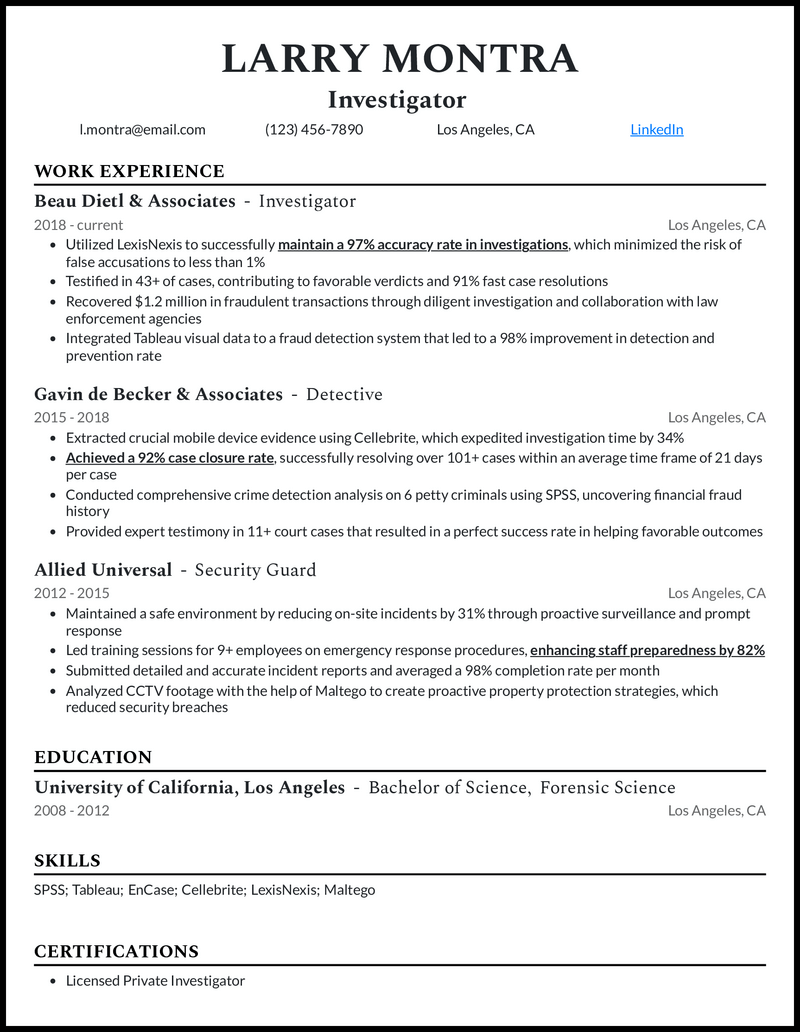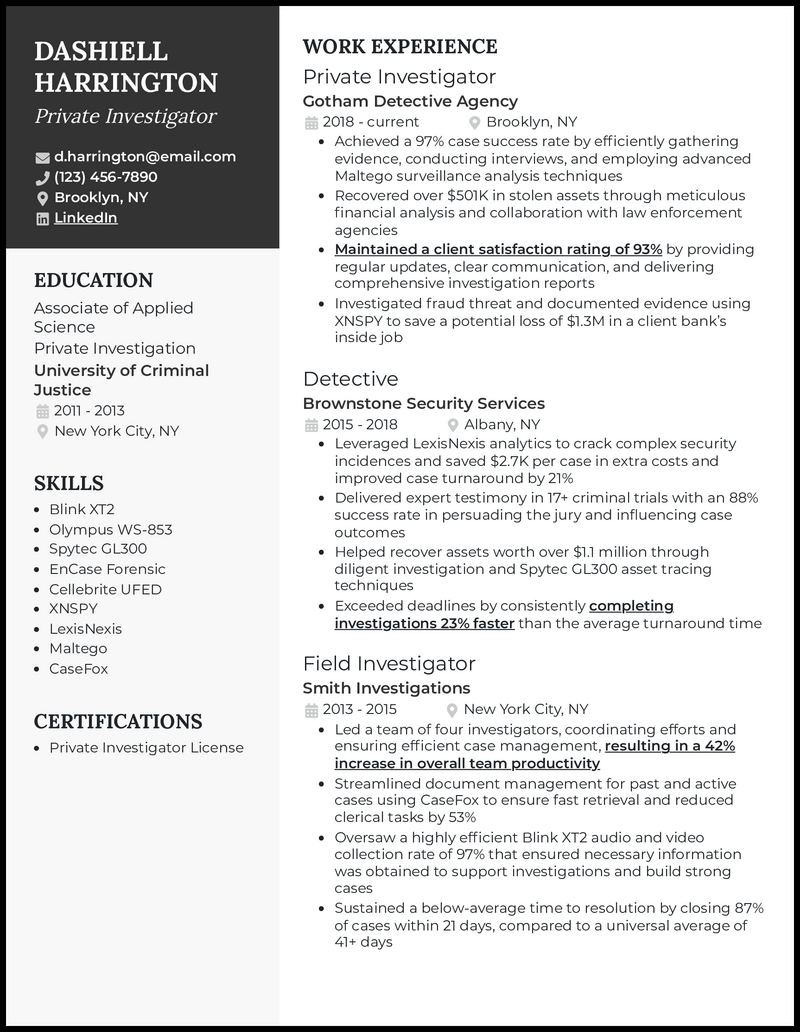Your role as an investigator involves unraveling mysteries, gathering evidence, and delving into the unknown to uncover the truth behind complex cases. With exceptional analytical skills, you connect the dots and follow leads to solve puzzles that confound others.
You’re a professional at firm but friendly witness interviews, conducting thorough research, and presenting your findings with clarity and precision. It’s really no wonder that building a resume that captures your diverse expertise is no easy task.
Allow us to lend a hand. Our investigator resume examples will show you exactly how to turn your experience into attention-grabbing bullet points and write a cover letter that get employers interested.
Why this resume works
- It is a universal belief that justice delayed is justice denied. As a detective, you would want a track record of doing your job and ensuring timely case resolutions.
- In fact, one of the things employers will be looking for in your investigator resume is the number of closed cases, where you stand better odds of getting the job if you highlight your 92% success case closure rate.
Why this resume works
- Sometimes, going through the life story and nail-biting events of an investigator is all police departments need to hire them. You don’t need to start out as an expert either.
- It’s completely fine to show your humble beginning from being a crime scene technician then becoming a police officer, and finally reaching an investigator role. Enriching your crime scene investigator resume with your career story can improve your chances of getting on the team.
Why this resume works
- Noticing an act of money laundering is tricky. You never know when a normal customer turns out to be dealing in black money. Here’s when a little professional background is going to help you out.
- Show employers that you’re a trained professional and know how to spot irregularities without throwing suspicion. Best way to do so? Simply add an education qualification like a bachelor’s in criminal justice on your AML investigator resume.
Why this resume works
- The ability to consistently prevent and mitigate financial fraud threats is one quality that will shore up your potential to be easily picked by employers ahead of other potential candidates.
- To turn this realization to your advantage, ensure your fraud investigator resume shows the impressive numbers of thwarted fraud cases and your proactive strategies to prevent and report threats in real time.
Why this resume works
- It’s an impressive attribute to be a terrific investigator, but you’ll need more than your natural talents to keep posting positive results in every case you handle. One genius way to stay ahead of the rest is by leveraging modern technology to prevent, detect, and solve cases in the shortest time possible.
- Therefore, your private investigator resume can get a competitive edge if you include your competencies in using tools such as LexisNexis to solve complex cases and save on time and costs.
Why this resume works
- The equation’s simple for this one. Police departments want professionals who can deliver and that’s all you have to prove in your criminal investigator resume.
- Use every previous job to your advantage and highlight your impact in solving cases to uncover multiple crimes like drug trafficking and stealing valuable property. If you feel like your bullet points need to be longer, use the elegant template to ensure everything fits on one page easily.
Why this resume works
- While people with different educational qualifications can apply to investigation roles, it doesn’t hurt to have a specialized degree in criminology.
- Create an extraordinary background investigator resume by blending a professional degree, a Private Investigator License, and a variety of software skills that can prove you have the technical prowess to excel in finding all past affiliations, job history, and criminal records of any employee.
Related resume examples
Tweak Your Investigator Resume to Make an Impression

It can be tempting to fill your resume skills section with investigator-like characteristics like “observant,” “analytical-thinker,” or “detail-oriented,” but it’s actually better to demonstrate these traits in your work experience bullet points than list them here.
For your skills list, focus on technical skills, tools, and software that you need for a job that people outside of the industry wouldn’t know about. These kinds of skills and industry knowledge are what instantly show recruiters that you’re a professional. This includes tools like Tableau for data analysis and forensics tools like EnCase Forensic.
The other key point is to change your skills section for each application, tweaking it to match the exact requirements of the job description in question. Whatever they want the most is what you should present yourself as an expert in.
Need some inspiration?
15 best investigator skills
- LexisNexis
- Splunk
- Nuix
- Legal Knowledge
- Case Fox
- Electronic Surveillance
- Magnet AXIOM
- Background Analysis
- Blink XT2
- Maltego
- Skip Tracing
- Palantir
- TLOxp
- EnCase Forensic
- Spytec GL300

Your investigator work experience bullet points
This part of your resume should be all about the results you’ve achieved for clients during your career. Simply listing your duties as an investigator wouldn’t actually tell recruiters whether you succeeded in those duties or not, so it’s much more effective to use the space to highlight personal achievements.
Examples include your contributions to significant cases, successful resolutions, and positive outcomes for clients or organizations. Project an aura of confidence by using active verbs and compelling language to describe how you solved complex cases, unearthed crucial evidence, and collaborated with teams to achieve results.
The last thing you need to make these bullet points shine is metrics. Back up everything you say with impressive numbers and accurate data to take your achievements from satisfactory to amazing.
- Showcase your overall effectiveness by displaying your case closure rate.
- Highlight the average time it takes you to collect crucial evidence, demonstrating your efficiency.
- If your work includes law enforcement or legal investigations, mention the percentage of cases that resulted in convictions.
- Validate your overall success and competency by calculating and presenting a client satisfaction rate.
See what we mean?
- Achieved a 97% case success rate by efficiently gathering evidence, conducting interviews, and employing advanced Maltego surveillance analysis techniques
- Reduced investigation time by 39% by implementing streamlined processes and leveraging CaseWare IDEA to identify and follow leads
- Utilized LexisNexis to successfully maintain a 97% accuracy rate in investigations, which minimized the risk of false accusations to less than 1%
- Achieved a 92% case closure rate, successfully resolving over 101+ cases within an average time frame of 21 days per case
9 active verbs to start your investigator work experience bullet points
- Investigated
- Uncovered
- Analyzed
- Collaborated
- Resolved
- Interviewed
- Identified
- Recovered
- Secured
3 Tips for Writing an Investigator Resume if You’re Still Fairly New
- Demonstrate adaptability
- Illustrate your flexibility and adaptability by discussing how you successfully handled various challenges during academic projects or part-time jobs. Mention instances where you quickly learned new tools or techniques to support your investigative work.
- Emphasize knowledge and ethical standards
- As an investigator, your actions need to be guided by a strict code of conduct and compliance with laws and regulations. To achieve this, you need to build a legal and regulatory knowledge foundation—demonstrate that you’ve completed this task and have a strong base to build on.
- Leverage certifications and training
- If you’re a private investigator, you need a specific license but there are also other kinds of certifications you can include on your resume to validate your expertise. Examples include the CFCE, CFE, and CFI.
3 Tips for Writing a Fantastic Investigator Resume if You’re a Seasoned Expert
- Detail complex investigations
- If you’ve handled intricate or high-profile cases, provide a concise overview of these complex investigations. Describe the challenges you faced, the strategies you employed, and the outcomes you achieved.
- Mention professional development
- Besides recent certifications, you can also highlight any specialized training, workshops, or advanced courses you’ve completed. This indicates your commitment to enhancing your investigative skills and expanding your knowledge base.
- Showcase collaborative experience
- Investigations often require teamwork and interdisciplinary cooperation. Highlight instances where you collaborated with other experts, such as law enforcement, legal professionals, or forensic specialists.
Including a career summary is optional—but it’s important to know that if you do include one, it needs to be tailored to the job. Mention the organization and position you’re applying to, and highlight a standout achievement that makes you the right investigator for the job.
Focus on technical skills like digital forensics, data analysis, report writing, and specific tools like Splunk, Excel, and EnCase Forensic. Make sure to mirror what’s mentioned in the job description as well.
Highlight measurable achievements such as case closure rates, successful convictions, assets recovered, or impactful collaborative investigations. Including metrics adds credibility to your resume and showcases your ability to deliver concrete results.












